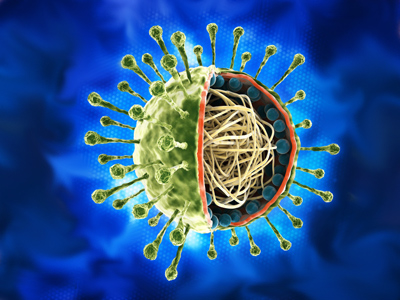
Ask the AI Tutor
Need help with Unit 1 - Vaccination? Ask our AI Tutor!
AI Tutor - Lucy
Connecting with Tutor...
Please wait while we establish connection

Immunity means resistant to infection. The picture shows a scientific image of a virus - it looks pretty, but won't do you any good!
Unit 1 - Vaccination
This GCSE Biology quiz explores how vaccination protects the body, using weakened or dead pathogens to train the immune system before a real infection happens.
1 .
Which of the following might you find in a vaccine?
Antigens
Neurons
Enzymes
Hormones
Antigens that are not attached to their pathogen pose no risk to the body, however, they will provoke your immune system to produce the correct antibodies to deal with them thus creating immunity
2 .
Which of the following is not a name for white blood cells?
Leucocytes
Lymphocytes
Memory cells
Erythrocytes
This is the scientific name for red blood cells
3 .
Which of following describes how antibodies are released after a person has been vaccinated?
Quickly and in large amounts
Slowly but in large amounts
The same as before
Quickly but a different antibody is made
It is important for your immune system to destroy the pathogen before it can reproduce faster than your white cells can destroy it or make it harmless
4 .
Memory cells are specialised types of which cells?
Red blood cells
Platelets
White blood cells
Nerve cells
Vaccination only works because these cells exist
5 .
Which of the following might you find in a vaccine?
Amoeba
Inactive bacteria
Fungi
Antibiotics
This is just one of the ways in which vaccines are made
6 .
White blood cells do not produce which of the following?
Antitoxin
Antibody
Antigen
Immunity
This is the part of the pathogen that triggers your immune system's response
7 .
Immunity means resistant to what?
Resistant to infection
Resistant to disease
Resistant to cancer
Resistant to invasion
You have a natural immunity to many infections
8 .
Which of the following types of cancer do we have a vaccination for?
Lung cancer
Heart cancer
Cervical cancer
Leukaemia
This is possible because most cases of cervical cancer are caused by a pathogen called the human papilloma virus (HPV), rather than a genetic problem or environmental causes
9 .
Pathogens do not include which of the following?
Bacteria
Viruses
Fungi
Plants
Pathogens are usually microorganisms and viruses
10 .
Vaccines are very safe for most people, but they can be dangerous for who?
People who are immune
People who are allergic
People who are resistant
People who are ill
Allergy is the most common reason for side effects after a vaccine. It can be very serious and lead to anaphylactic shock
You can find more about this topic by visiting BBC Bitesize - Treating, curing and preventing disease
**Unlimited Quizzes Await You! 🚀**
Hey there, quiz champ! 🌟 You've already tackled today's free questions.
Ready for more?
Ready for more?
🔓 Unlock UNLIMITED Quizzes and challenge yourself every day. But that's
not all...
not all...
🔥 As a Subscriber you can join our thrilling "Daily Streak" against other
quizzers. Try to win a coveted spot on our Hall of Fame Page.
quizzers. Try to win a coveted spot on our Hall of Fame Page.
Don't miss out! Join us now and keep the fun rolling. 🎉
**Unlimited Quizzes Await You! 🚀**
Hey there, quiz champ! 🌟 You've already tackled today's free questions. Ready for more?
🔓 Unlock UNLIMITED Quizzes and challenge yourself every day. But that's not all...
🔥 As a Subscriber you can join our thrilling "Daily Streak" against other quizzers. Try to win a coveted spot on our Hall of Fame Page.
Don't miss out! Join us now and keep the fun rolling. 🎉






